My first glimpse of the sensual world of Atom Egoyan was several years ago. The Sweet Hereafter (1997) brought me to a new level of cinematic experience. Soundly adapted from the equally acclaimed Russell Banks novel, it tells the story of how a close-knitted New England community was ravelled by a freak accident that led to the deaths of the town's children. Those who have seen it would agree not only does it feature some of the most beautiful and richly composed images in contemporary cinema - think Lost in Translation with the edge of Invisible Waves - it also resounds with an intellectual maturity that provokes audiences with its moral drama and reassures by its humanity. The haunting score by Mychael Danna further laces the film with a sense of tragic ethereality. The Sweet Hereafter won the Grand Prix at Cannes that year. Egoyan himself was nominated for a couple of Oscars. Those who haven't seen the film, should.

"Krapp's Last Tape, which I directed for television, has this character (played by John Hurt) who sits in his dilapidated office listening to audio recordings he made as a young man, intermittently exhibiting disbelief and intense disavowal at what the tapes say. What I find interesting about Beckett is what he has to say about memories and their mediation. Very often the things we remember are really the projections of our own desires upon memory. This is not restricted to the way we remember things - how we perceived things, humans, situations around us is pretty much the same. I'm totally obsessed with how we construct realities. There is a side to my work that is very formal, but I'm always looking at how we access emotions and I think that, in the case of film, that is given to us way too easily."
Those familiar with the oeuvre of Egoyan might notice a veritable progression towards greater sensuality - the images lusher and more ethereal in his later films, while the early ones recall the composition of Hanake without his clinical edge - with Exotica marking that moment of aesthetic inflexion.
"In fact, I really much prefer the early films to the ones I did later in my career as a film-maker. I really like those early films a lot. I understand that they can be quite hard-going for people... To me those films are weirdly operatic - you see all these characters experiencing extreme emotions but they are not showing it, or rather they are showing it in a restraint way. Their emotions are mediated by their restraint, and for me that's interesting because often we encounter things that may trick us into treating them as directly as we perceive them, when in fact we have missed the truth in our haste to apprehend. Also, I was very much interested in the notion of alternate families. In my first feature (Family Viewing), for example, there is this character who was unhappy with his biological family and ends up sort of creating this other one. And I think in the gay community, very often alternate families are created and they are healthier, often, than the biological families that are imposed on us. Maybe, in a way, the gay community has always been ahead of the heterosexual conventional notion of what a family should be. I've always found that inspiring."
And so are you Mr Egoyan.
But the reality of it is, none of his early films can be easily available locally. I'm not sure if they were even screened in local cinemas at the time of their release, or even at previous Singapore Film Festivals. Which is a shame, because Egoyan's films are truly one of a kind. Aside from its detachment, his films generally feature a wide cast of characters. Watching an Egoyan film is like, at times, watching a community of disparate lives intersecting at crucial crossroads to arrive at their own moral destinies. While not being generally associated with queer cinema, Egoyan's films do feature a slew of gay characters. In The Adjuster, Noah sleeps with his gay client, apparently seduced, but probably out of empathy on his part - the latter just lost his house to a fire. In Exotica, Thomas buys an extra ticket for the ballet so he might get lucky with "potential strangers." In Ararat (2002), Philip has to battle the homophobia of his father. What is striking about this straight and happily married Canadian director (his wife is actress Arsinee Khanjian) is the way he integrates these characters into his films without making them out to be emblems of cheap tokenism.
"With regards to Noah in The Adjuster, he was a character who was able to transpose his sexuality based on what others projected him to be. As such he was a sort of polysexual being - and this was perceived by the audience as groundbreaking at that point - and I think we are really much more adaptable in our sexuality than we often consider. A lot of my films explore the sexual lives of my characters, and they often find themselves in situations in which they have to redefine their sexuality - thus the nature of their relationships with each other - a sense of who they might be."
In 2005, Egoyan directed his eighth feature: Where The Truth Lies. By far his most lavish film - budget wise - it stars Kevin Bacon and Colin Firth, each playing two halves of a celebrity comedy team in 50s America. Once again Egoyan taps into the deep dark recesses of the human psyche, this time to reappropriate the traditions of the Noir genre. Sex and murder, hedonism and men-in-uniform - this isn't Chicago, but something more philosophically profound. Some critics might disagree, lambasting the film for its philosophical hyperboles quite unfit for the meagre fodder of its storyline. That is, of course, of not much interest to us for the characters that Bacon and Firth assume are gay (or bisexual), giving a whole new meaning to "tag-team." The film essentially houses a tragedy at the core of its story, but the way it is done (and acted at times) makes me... Well, personally, I find the film prime for Camp appropriation. That is, of course, not the intention of Mr. Egoyan. The film might, like Gangs of New York, gather prestige over time, but for now it is an utterly, mindlessly enjoyable flick - if you left your film-critic-pseudo-intelligentsia mode at the ticketing counter. I dare say a bad Egoyan is better than a bad Tarantino (which is a quite a tautology, actually) anytime. And though the dialogue killed me, many times, Mr Egoyan has lost none of my respect as one of the most talented auteurs to have emerged from Canada. His film of 2002, Ararat, the first film ever to deal with the Armenian genocide, is arguably one of the most challenging, intelligent and profound historical film ever made. Move aside Spielberg.
With regards to Ararat, Egoyan has this to say: "The film deals with notions of tolerance - not only tolerance towards other cultures, but in the case of the gay son, him perceiving intolerance from his father. I'm interested in human beings and how we communicate with each other."
Sexuality, orientation, labels. What we desire does not define who we are as human beings - we forget the projections others make on us. Egoyan reminds us through his films. However, this is not to say some stands, some "labels," are not worth fighting for. Politics demand that. Even if they are ultimately, conceptually, illusory. I guess that's some kind of truth.
Win one of five copies of the novel Where the Truth Lies when you subscribe (or update your particulars) to the Fridae Arts & Entertainment Mailing List. >> Sign up/update here! Entries close Apr 27, 2006. (Prizes courtesy of Golden Village, Pansing Distribution and Festive Films)












 Printable Version
Printable Version









